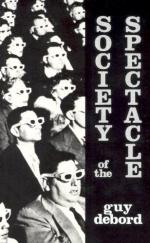
|
| Name: _________________________ | Period: ___________________ |
This test consists of 15 multiple choice questions and 5 short answer questions.
Multiple Choice Questions
1. Which Shakespeare play does Chapter 5 quote?
(a) King Lear.
(b) Romeo and Juliet.
(c) Henry IV.
(d) Othello.
2. What effectively erases history, according to Debord?
(a) Irreversible time.
(b) Logical time.
(c) Cyclical time.
(d) Agrarian time.
3. What kind of religion was a compromise between myth and history, according to Debord?
(a) Agnostic.
(b) Aetheistic.
(c) Monotheistic.
(d) Polytheistic.
4. What does Ruge doubt he will see in his lifetime?
(a) Society of the spectacle.
(b) Political revolution.
(c) Production equlity.
(d) Bourgeoisie power.
5. What period does Debord consider to be the beginning of Art?
(a) Baroque.
(b) Dadaism.
(c) Minimalism.
(d) Impressionism.
6. What is the most important unit in the packaged commodity of time, according to Debord?
(a) Leisure.
(b) Labor.
(c) History.
(d) Production.
7. What era does Debord say was obsessed with death?
(a) Ancient Greece.
(b) Middle Ages.
(c) Renaissance.
(d) Ancient Rome.
8. The unified critique of culture includes the culture of knowledge and the culture of _____, according to Debord.
(a) Art.
(b) Literature.
(c) Politics.
(d) Poetry.
9. What two poles does Debord believe the history of economy has turned on?
(a) North and south.
(b) Rich and poor.
(c) Town and country.
(d) Rulers and subjects.
10. What do societies focus on in Chapter 5 to enable them to span time?
(a) Learning.
(b) Writing.
(c) Money.
(d) Technology.
11. Debord states at the end of Chapter 6 that the world has the ______ of another kind of time.
(a) Power.
(b) Will.
(c) Focus.
(d) Dream.
12. What is the product of the leisure of localizations in Chapter 7?
(a) Urbanization.
(b) Freedom.
(c) Tourism.
(d) Alienation.
13. What kind of pseudo-cyclical time is time in the spectacle, according to Chapter 6?
(a) Valuable.
(b) Consumable.
(c) Historic.
(d) Useless.
14. What seeks to supersede all elements of historic time in Debord's opinion?
(a) Revolutionary thought.
(b) Spectacular society.
(c) Political power.
(d) Economic imperative.
15. Debord considers _______ and surrealism to be the theoretical endpoint for Art.
(a) Impressionism.
(b) Dadaism.
(c) Baroque.
(d) Minimalism.
Short Answer Questions
1. Debord characterizes time in a classless society as being what?
2. What does urbanism institute as it destroys the cities in Chapter 7?
3. What are the temples of frenetic consumption in Chapter 7?
4. Art's declaration of what was both its beginning and its end, according to Debord?
5. Who is representative of a person leaving cyclical time in Chapter 5?
|
This section contains 344 words (approx. 2 pages at 300 words per page) |

|




